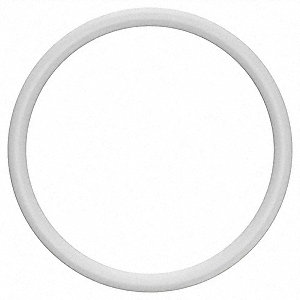Sealing solutions are crucial in many industrial sectors. Among them, FFKM (Perfluoroelastomer) seals are highly valued for their exceptional resistance to aggressive chemical environments and high temperatures. Traditionally black, these seals contain carbon black, an additive that enhances their mechanical properties. However, in industries where even microscopic contamination is unacceptable—such as pharmaceutical and food production—black FFKM seals can pose a risk.
To address this issue, research and development have led to the creation of white FFKM seals, which replace carbon black with barium sulfate (SiO₂). These seals retain the benefits of black FFKM while eliminating the risk of visible contamination.
This article explores the differences between black and white FFKM seals, their applications, and why white FFKM is the ideal solution for high-purity industries.
1. FFKM: Advanced Technology for Sealing
FFKM (Perfluoroelastomer) seals are high-performance polymers that combine the elasticity of elastomers with the chemical resistance of fluoropolymers like PTFE (Teflon).
Key Properties of FFKM
- Excellent chemical resistance: Withstands a wide range of aggressive chemicals, including solvents, strong acids, and bases.
- High thermal resistance: Operates in extreme temperatures, up to 300°C and beyond, depending on the formulation.
- Low permeability: Minimizes the risk of fluid leakage and contamination.
- Exceptional durability: Offers longer service life, reducing maintenance costs.
Thanks to these characteristics, FFKM seals are widely used in petrochemicals, aerospace, electronics, medical, and food industries.
2. The Problem with Black FFKM Seals
Black FFKM seals are reinforced with carbon black, an additive that:
✅ Improves the mechanical strength of the material.
✅ Increases density and robustness.
✅ Protects against UV degradation and oxidation.
However, in pharmaceutical and food production, this black color can be a serious concern. Why?
👉 Particle Migration: Although FFKM seals are highly resistant, tiny carbon black particles may detach and mix with the fluid they are sealing.
👉 Contamination Risk: In an oil refinery, this wouldn’t be an issue. But in a food or pharmaceutical factory, even microscopic black particles could lead to entire batch rejections, causing financial loss.
👉 Harder to Detect Impurities: When a black FFKM seal starts to wear down, detecting contamination or deterioration visually is more difficult.
3. The Solution: White FFKM Seals
To solve these issues, manufacturers developed white FFKM seals, formulated with barium sulfate (SiO₂) instead of carbon black.
Benefits of White FFKM Seals
✅ Zero risk of visible contamination: Eliminating carbon black prevents black particle migration.
✅ Compliance with strict regulations: Meets the hygiene and safety standards required in cleanroom environments, pharma, and food industries.
✅ Better traceability: If a seal deteriorates, wear and contamination are easier to detect on white material.
✅ Optimized inventory management: Standardizing all seals in one color (white) simplifies stock management and reduces storage costs.
One of the most advanced solutions in this category is the Ultima 7004 model, which offers performance nearly identical to black FFKM while ensuring enhanced safety.
4. Applications of White FFKM Seals
White FFKM seals are highly recommended for industries where cleanliness and contamination-free production are critical:
🏭 Pharmaceutical Industry
- Used in the production of medications, vaccines, and injectable solutions.
- Prevents contamination that could cause costly product recalls.
🍽 Food & Beverage Industry
- Essential in food processing and beverage production lines.
- Complies with strict food safety regulations (FDA, EU 1935/2004, etc.).
🏥 Medical & Biotechnology
- Used in laboratory equipment, medical devices, and sterilization systems.
- Ensures zero risk of foreign particle contamination in highly sterile environments.
🔬 Chemical & Microelectronics Industry
- Suitable for applications that require perfect sealing with no risk of particle release.
- Resistant to harsh solvents and demanding manufacturing conditions.
5. Black vs. White FFKM Seals: Which One to Choose?
The choice between black and white FFKM seals depends on several factors:
| Criteria | Black FFKM | White FFKM |
|---|---|---|
| Chemical resistance | ✅✅✅ | ✅✅✅ |
| Maximum temperature | ✅✅✅ | ✅✅✅ |
| Prevention of contamination | ❌ Risk of black particles | ✅ No risk |
| Use in clean environments | ❌ Not recommended | ✅ Ideal |
| Inventory management | Standard | ✅ Optimized |
| Defect detection | ❌ Harder to spot | ✅ Easier to spot |
If your industry does not face contamination risks and requires maximum mechanical resistance, black FFKM seals remain a good choice.
However, if hygiene, purity, and regulatory compliance are priorities, white FFKM seals are the best solution.
Conclusion
FFKM seals are a benchmark for high-performance sealing. The adoption of white FFKM, particularly in pharmaceutical and food industries, represents a strategic advancement to ensure safer and compliant production.
👉 Need white FFKM seals for your business? Contact us today to explore our tailored solutions.

